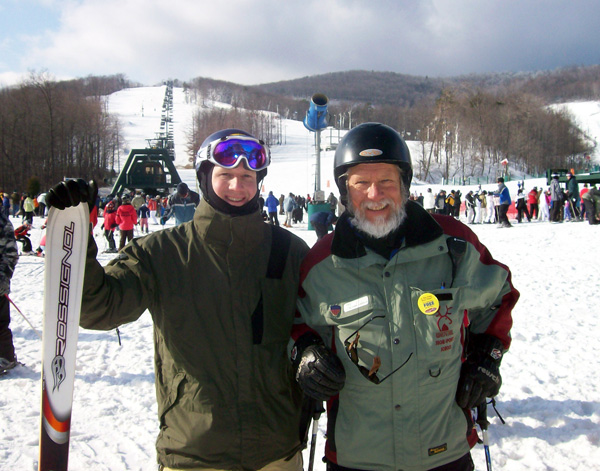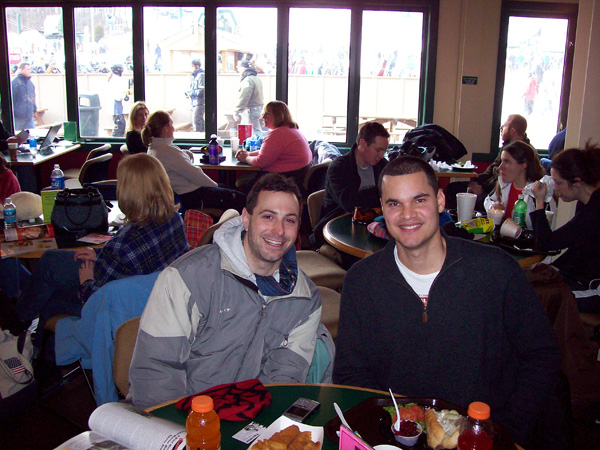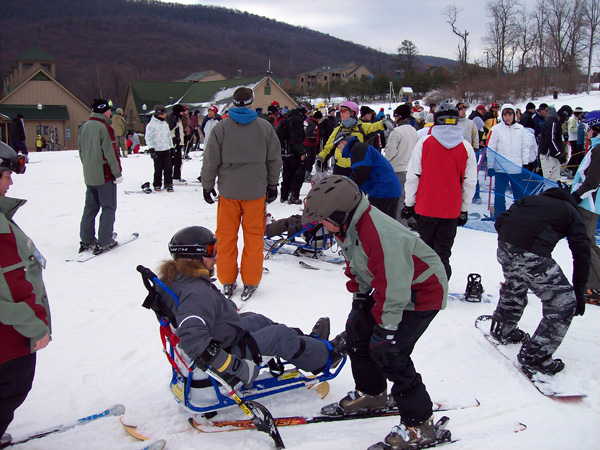Whitetail is dramatically increasing its instruction programs for adaptive skiers and snowboarders. It launched its new program on a crisp, crowded Sunday on January 11, 2009. The head of the program is Bill Dietrich, the Executive Director of “Two Top Mountain Adaptive Sports Foundation.” He has been a ski instructor at Whitetail since 1992. The Foundation is one of the newest chapters of Disabled Sports USA, the hardworking foundation that is headquartered in Rockville, Maryland. Bill says “this foundation will be a resource for all disabled people in our region… but Whitetail’s proximity to Walter Reed and the large number of veterans in our area gives the foundation a natural focus on wounded warriors.”

|
|
Major David Rozelle and Bill Dietrich. Photo provided by Charles Sneiderman.
|
About 30 instructor volunteers were at Whitetail Sunday. They received special instruction from Major David Rozelle and other skiers with disabilities. Army Major Rozelle is an amputee Iraqi veteran and author. He is the first amputee to return to active duty in a combat zone, and wrote a memoir entitled, “Back in Action: An American Soldier’s Story of Courage, Faith, and Fortitude.”
Rozelle writes, “after returning from Iraq, I learned snowsports are an amazing equalizer for people with disabilities. Gravity is what makes you go, which means people with disabilities are often just as agile on snow as their able-bodied friends … For veterans normalizing their lives after severe wounds, snowsports can be a remarkably empowering experience.”

|
|
Volunteers Daniel Longo and Jeremiah Perez of Washington, D.C. Photo provided by Charles Sneiderman.
|
Other special instructors included Tom Gormon, Scott Seiss, Jeremiah Perez, and Dan Longo. They are all handsome and fit young men, despite all they have endured. Tom Gormon is a paraplegic skier who uses a “monoski” (a bucket-like chair on skis) to zip down the mountain. He writes, “disabled athletes with a little courage and balance find they can turn, jump, and fly down a mountain as well as anyone.” He is being modest about the courage part - it takes a lot of courage and upper body strength to navigate the sit ski. In the learning stages, the chair is held back by other instructors with tethers. That also takes a lot of strength and skill on their part. My husband Charles and I thought of trying it, but we need much more training before we can help the adaptive skiers and boarders. These instructors often have years of training and certification as regular instructors, before they undertake the adaptive programs. Many of them are volunteers, who donate their time, skills, and effort.

|
|
Volunteers learn to both tether the biskis and experience the ride. Photo provided by Charles Sneiderman.
|
The focus on adaptive sports also highlights safety concerns. We all know there are dangers in any sports, although the drive to the slopes may be the most dangerous part of all! But, from January 17th on, Whitetail sponsors “Slope Safety Week.” Charles Buddy Callahan and Mary Godofsky tell us there are a number of activities, videos, posters, and handouts planned. There is also a recruitment drive for those eligible for Ski Patrol and the Mountain Safety Team. So, those who do not want to cope with the millions of people in Washington that weekend may want to take several snow days, and learn about mountain safety, and new instruction programs. Remember, there are also a number of attractive lift, rental, and instruction packages available - especially for beginning skiers and snowboarders. I don’t want to take anything away from the Inauguration - I am excited about it. But, for one special weekend, the slopes may actually be less crowded than Washington!
When she wasn't skiing, Connie Lawn covered the White House as a reporter since 1968.

Join the conversation by logging in.
Don't have an account? Create one here.